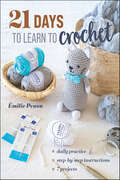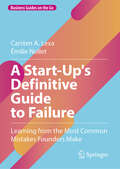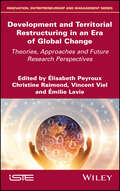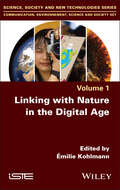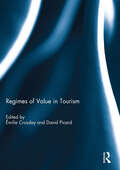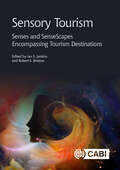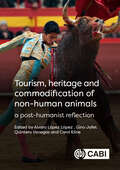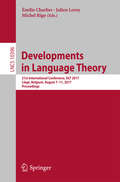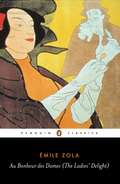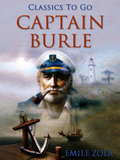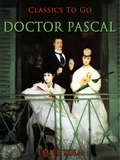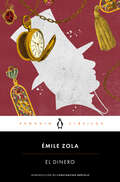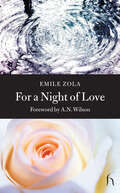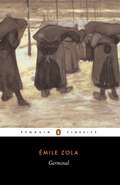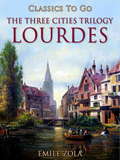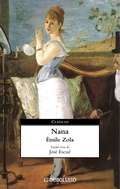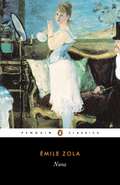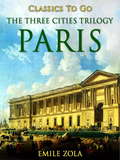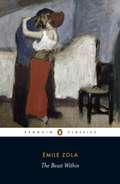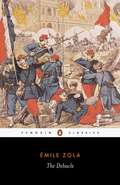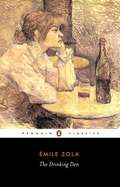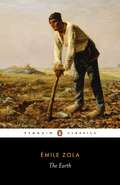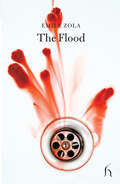- Table View
- List View
21 Days to Learn to Crochet: Daily Practice, Step-by-Step Instructions, 7 Projects
by Émilie PenouMaster the art of crochet in just 21 days!In 21 days, you&’ll learn everything there is to know about crochet! By alternating between learning and creating, this hands-on method helps you quickly master the essential techniques and stitches. Start your crochet journey with delightful projects like granny squares, tawashi, baskets, shawls, and amigurumi. With detailed step-by-step tutorials and illustrated photos, you&’ll make swift progress and gain the confidence to tackle any crochet project you dream up!Go from beginner to confident crocheter with step-by-step crochet instructions, where each day brings a fresh new lessonBuild muscle memory by practicing daily how to do basic stitches, color switches, and how to increase and decrease stitches with easeEnjoy a structured and fun learning experience following a proven formula: two days of learning, one day of goal-oriented practice, and one day for finishing touches
A Start-Up's Definitive Guide to Failure: Learning from the Most Common Mistakes Founders Make (Business Guides on the Go)
by Carsten A. Lexa Émilie NolletSeven out of ten start-ups fail. The reasons for failure are well-known. Yet founders often fail to approach the topic of failure with the seriousness and commitment it deserves. This book aims to change that and offers a new approach for founders to “drive their start-up off a cliff.” Structured as a “how-to guide to failure,” it highlights the most common mistakes founders make, explains where they come from, and illustrates them with real-life examples. The goal of the book is to help founders make the “right” mistakes in order to fail more efficiently (and perhaps help them avoid making these mistakes in the first place). The book includes an interview with German “start-up legend” Prof. Günter Faltin.
Broadband Wireless Communications for Railway Applications: For Onboard Internet Access and Other Applications (Studies in Systems, Decision and Control #82)
by Marion Berbineau Émilie MassonThis book focuses on the needs of railway operators in terms of wireless communications, divided in two main categories: the commercial services and the operational needs. Then, all available technologies that can be used to provide Internet access on board trains and all the other operational applications requiring high capacity are detailed. Finally, challenges and trends in railway telecommunications are highlighted, through the presentation of the future and emerging technologies, the current discussions and works in the different authorities, and the key challenges and scientific barriers.
Development and Territorial Restructuring in an Era of Global Change: Theories, Approaches and Future Research Perspectives
by Christine Raimond Vincent Viel Élisabeth Peyroux Émilie LavieThinking about development and the environment simultaneously is one of the biggest scientific and societal challenges of the 21st century. Understanding the interactions between biophysical systems and human activities in an era of global change requires overcoming disciplinary divides and opening up new epistemological perspectives. This book explores these challenges using a territorial lens. Combining various scales of analyses (from global to local) and contexts (both urban and rural) in the North and in the South, it analyzes the relationships between environment and development through a variety of geographical objects (i.e. cities, rural and agricultural areas, coastlines, watershed), themes (i.e. ecological transitions, food, energy, transport, agriculture, mining activities) and methodologies (i.e. qualitative and quantitative approaches, modeling, in situ measurements). By engaging in a dialogue between social science and natural science disciplines, within different fields and with a variety of forms of knowledge production, this book provides essential information for understanding and reading the complexity of a globalized world. This book is targeted at academics and students in social sciences and at stakeholders in the field of territorial and environmental management.
Linking with Nature in the Digital Age
by Émilie KohlmannThe use of digital technology in our societies is growing to meet the ever-increasing challenges of data collection, raising awareness, education and understanding nature. Artificial intelligence, for example, appears to be the answer to collecting massive amounts of data on biodiversity at a global scale and facilitating citizen participation in such data collection. Linking with Nature in the Digital Age explores the reconfiguration of our relationship with nature within this digital framework. This book examines this mediated linking from three angles. Firstly, it shows how digital technology can foster the development of links to nature. Then, it describes in greater detail the materiality of these links and how they have evolved with the developments in information technology. Finally, it questions the belief in the digital as a facilitator and opens up new perspectives on our relationship with nature and the living world
Make, Stitch & Knit for Baby: 35 Super-Cute and Easy Craft Projects
by Émilie GuelpaThis contemporary craft book is packed with easy, affordable projects to help you make unique baby gifts with a French-chic twist.From simple cotton bibs, shorts and soft toys, to a basic cushion and straightforward knitted blanket, the projects are clearly explained and easy-to-follow. Other crafty step-by-steps include a hanging mobile, finger puppets, soft rattles and sensory toys. Whether you're expecting a baby and want to add a personal touch to their bedroom, or you'd like to make something special for your grandchild or friends' babies, Make, Stitch & Knit for Baby is the go-to book for creating handmade, stylish baby items. Each project is set out with easy-to-follow, step-by-step instructions and range from curious beginner, to providing inspiration for the more experienced crafter.
Regimes of Value in Tourism
by Émilie Crossley and David PicardDrawing from ethnographic work in five continents, this book demonstrates how different regimes of value in tourism can coexist, collide, and compete across a varied geographic terrain. Much theory in tourism economics defines ‘value’ as a measure of monetary worth, a concept governing commodity exchange, and a gauge for tourist satisfaction. The research included in this volume shows that tourism not only feeds off existing conceptions of value as a monetary category, but that it is also instrumental in reproducing and reinforcing those subjective, morally heightened, and highly intangible values that make tourism and the tourism economy a complex social, cultural, political, and psychological phenomenon. The book pushes the debate about the tourism economy beyond a simplistic understanding of producer-consumer relations, instead suggesting a refocus on the social, spatial, and temporal lags in tourism production, and the ensuing differentiated regimes of values.This book was published as a special issue of the Journal of Tourism and Cultural Change.
Sensory Tourism: Senses and SenseScapes Encompassing Tourism Destinations
by Carlos Ferreira Karen Davies Rubén C. Lois-González Gunnar Thór Jóhannesson Professor Katrín Anna Lund Carla Fraga Elisa Alén González Philip Stone Tim Taylor Trinidad Domínguez Vila Kathryn Terzano Émilie Crossley Hilary Becker Sara Duerte Prof. Dr. Hairul Nizam Ismail Sofie Scheen Jahnsen Claudette John Margaret Kenna Jaciel Gustavo Kunz Sharanya M Chandru M C Dr Velvet Nelson Dr Nur Haizum Rahman Breixo Martins Rodal Carlos Alberto Romarís Lucia Rubio Bidisha Sarkar Dr Deborah Slater Patricia A. Stokowski Dr Pola Wang Dr Aristeidis Gkoumas Dr Nur Hidayah RahmanTourism offers countless global locations, providing a multitude of sensory experiences. These include commercialised tourism products such as saunas and floatation tanks through to natural phenomenon such as mountains and wilderness destinations. Consequently, sensory elements are a curious concept within tourism because every destination provides a sensory experience of one kind or another. The first of its kind, this book examines holidays and tourism through sensory perceptions which either encourage or deter consumers. It studies sensoryscapes and how they effect and affect tourism at destinations and be linked with the development of tourist niches, reflecting the segmenting of the mass market tourism into smaller segments. Finally, it reflects on how with increased urbanisation there a growing need is to find quiet spaces, free from urban or anthropogenic noise, such as silent retreats and dark sky meditation holidays. Escape has always been one of the main components of tourism development together with attraction to spatial locations that match tourists' needs. Structed to address each of the senses separately, this book provides a: · wide range of case studies from interdisciplinary backgrounds · links amongst common themes across the various threads of research on sensory experiences · theoretical framework and practical application for sensory tourism. It will be of interest to those studying tourism management as well as wider social science disciplines.
Tourism, Heritage and Commodification of Non-human Animals: A Posthumanist Reflection
by Alejandro Morales Carolin Funck Gustavo Ortiz-Millán Johan Edelheim Bobbie Chew Bigby Tomas Arias Jean Azcatl Pineda Alicia Mariana Pérez Émilie Crossley Georgina Flores Leonardo Garavito-González Yulei Guo Dr Jes Hooper Brenda Martínez Velasco Mateo Nicolás Medina Jorge Iván Barrera Javed Salim Estephania Sepúlveda Perdomo Rie Usui David A. Varela-Trejo Nusrat YasmeenHeritage is a social construction rooted in modern and contemporary societies. It is commonly a positive assessment of many elements of the physical and human environment (e.g. ecosystems and landscapes, monuments, customs, gender norms, religious practices, gastronomy, and livelihoods). Heritage and tourism are strongly related to each other in that heritage gives rise to tourist attractions and activities, and tourism enhances the designation of heritage sites. Non-human animals (hereafter 'animals') are present as implicit or explicit heritage elements through multiple tourist environments: animals may be themselves the heritage focus of tourist interest (visual arts, gastronomy, as charismatic and distinguished beings, as part of festivities or rituals), or it may be that animals are agents involved in heritage tourist environments such as working animals or in recreational activities. A post-humanist perspective the moral valuation of equality between humans and other animals demands that both are sentient beings and self-aware of their pain and pleasure. Thus, the involvement of animals as heritage elements by themselves or as an element of tourist consumption in heritage sites implies their commodification and lack of agency. As such, these practices are usually unethical, since they threaten the animals' primary interests: not to suffer, not to feel pain and to be able to live their freedom. This book contains chapters that reveal both the unethical interactions between humans and animals within heritage tourism, and those that show experiences in which efforts are made to minimize damage within the commercialization of animals involved as heritage themselves. It will be of interest to postgraduate students, academics, NGOs and tourism planners.
Developments in Language Theory
by Michel Rigo Émilie Charlier Julien LeroyThis book constitutes the proceedings of the 21st International Conference on Developments in Language Theory, DLT 2017, held in Li#65533;ge, Belgium, in August 2017. The 24 full papers and 6 (abstract of) invited papers were carefully reviewed and selected from 47 submissions. The papers cover the following topics and areas: combinatorial and algebraic properties of words and languages; grammars acceptors and transducers for strings, trees, graphics, arrays; algebraic theories for automata and languages; codes; efficient text algorithms; symbolic dynamics; decision problems; relationships to complexity theory and logic; picture description and analysis, polyominoes and bidimensional patterns; cryptography; concurrency; celluar automata; bio-inspiredcomputing; quantum computing.
Au Bonheur des Dames (The Ladies' Delight): (the Ladies' Delight)
by Émile ZolaNow the basis for the major BBC tv adaptation The Paradise, this is a lavish drama and a timeless commentary on consumerism. The Penguin Classics edition of Émile Zola's The Ladies' Delight is based on an acclaimed, vivid and modern translation by Robin Buss, who has also introduced the novel.The Ladies' Delight is the glittering Paris department store run by Octave Mouret. He has used charm and drive to become director of this mighty emporium, unscrupulously exploiting his young female staff and seducing his lady customers with luxurious displays of shimmering silks, satins, velvets and lace. Then Denise Baudu, a naïve provincial girl, becomes an assistant at the store - and Mouret discovers that he in turn can also be enchanted. With its greedy customers, gossiping staff and vibrant sense of theatre, The Ladies' Delight (Au Bonheur des Dames in the original French) is one of the most richly exciting novels in Zola's Les Rougon-Macquart cycle.This edition also contains a bibliography, introduction, chronology and explanatory notes.Emile Zola (1840-1902) was the leading figure in the French school of naturalistic fiction. His principal work, Les Rougon-Macquart, is a panorama of mid-19th century French life, in a cycle of 20 novels which Zola wrote over a period of 22 years, including Au Bonheur des Dames (1883), The Beast Within (1890), Nana (1880), and The Drinking Den (1877).'A complete page-turner about the consumer society, greed, fashion and instant gratification'India Knight'A fine translation'The Times Literary Supplement
Captain Burle: In English Translation (Classics To Go)
by Émile ZolaCaptain Burle is a short novella in four chapters by Emile Zola. The title character is an army quartermaster whose best days are long behind him. A widower, he lives in a squalid hovel with his mother and son. In the early days of his military career, he showed signs of heroic promise, but these days he’s content to contribute the bare minimum to his nation in exchange for an adequate paycheck. Much of his income is squandered on gambling and a woman of ill repute. His mother, the stern widow of a distinguished colonel, is ashamed of her son and laments his lost potential. One stormy night, her son’s commanding officer shows up on her doorstep. Major Laguitte has discovered that Burle is stealing funds from the army coffers. In order to save his old friend from a court-martial and hanging, as well as cover his own hide, Laguitte looks for a way to quickly and discreetly resolve the matter before any of the military higher-ups find out the money is missing. (Amazon)
Doctor Pascal (Classics To Go #20)
by Émile ZolaThis final volume in Zola's twenty-book Rougon-Macquart cycle serves in many respects as an epilogue to the series-but it's also a fine tale in its own right. Doctor Pascal, approaching old age, looks back on his life and finds himself asking whether he has made the right choices . . . and the answers he finds aren't always what you'd expect. Those who enjoy Zola's better-known novels will find much to appreciate here as well. (Goodreads)
El dinero
by Émile ZolaUna novela de plena vigencia sobre las grandes burbujas de los mercados financieros y los escasos escrúpulos de los especuladores Introducción de Constantino Bértolo Traducción de Mariano García Sanz El dinero cuenta la historia de Arístide Saccard, un emprendedor que decide fundar un banco utilizando el engaño y la especulación financiera para subvencionar unos dudosos proyectos en Oriente Medio. Movido por la avaricia, Saccard emprende unos cálculos y maquinaciones sin escrúpulos que pronto lo conducen a una especie de estafa piramidal, en cuyo entramado de expectativas y promesas de enriquecimiento rápido acaban enredados todos los personajes de la novela. Nuestra edición ofrece la cuidada traducción de Mariano García Sanz precedida por una abarcadora introducción a cargo de Constantino Bértolo, quien sitúa la obra en el contexto de la saga de Zola sobre los Rougon-Macquart, al tiempo que arroja luz sobre el trasfondo económico y político de su historia. Leopoldo Alas «Clarín» dijo:«De todas las novelas de Zola se podrían hacer grandes cuadros, por la fuerza plástica, por la precisión y la expresión de las líneas».
For a Night of Love (Hesperus Classics)
by A. N. Wilson Émile ZolaIn these three short stories, Émile Zola presents characters in search of fulfillment—romantic, religious, and financial. Read together, they give us an extraordinary depiction of sexual mores. When the apparently angelic Thérèse commits murder, she offers sexual favors to a petty clerk if he will dispose of the body; the pregnant Flavie manipulates a neighbor's interest in her dowry to arrange a shotgun wedding; and churchgoing women find their hunger for Christianity unsatisfied by a vapid priest. These are beautiful and poignant stories unified by the powerful themes of deception and discontent.
Germinal
by Émile ZolaConsidered by André Gide to be one of the ten greatest novels in the French language, Émile Zola's Germinal is a brutal depiction of the poverty of a mining community in northern FranceÉtienne Lantier, an unemployed railway worker, is a clever but uneducated young man with a dangerous temper. Compelled to take a back-breakin job at Le Voreux mine when he cannot get other work, he discovers that his fellow miners are ill, hungry and in debt, unable to feed and clothe their families. When conditions in the mining community deteriorate even further, Lantier finds himself leading a strike that could mean starvation or salvation for all. The thirteenth novel in Zola's great Rougon-Macquart sequence, Germinal expresses outrage at the exploitation of the many by the few, but also shows humanity's capacity for compassion and hope.Translated with an introduction by Roger Pearson in Penguin Classics If you enjoyed Germinal, you might like Zola's Thérèse Raquin, also available in Penguin Classics.
Lourdes: The Three Cities Trilogy (Classics To Go)
by Émile ZolaIn this moving depiction of a pilgrimage to Lourdes, the master French realist has created a novel of vivid characters and subtle commentary on suffering and the belief in miracles as the last desperate refuge from pain. Based on his own trip to the fabled grotto, the novel follows a simple five-part structure corresponding to the five-day train trip from Paris to Lourdes and back. (Goodreads)
Nana
by Émile ZolaLos mejores libros jamás escritos. «Hija mía, donde hay mujeres, hay bofetadas.» Corre el año 1867, el año de la Exposición Universal. Mientras la Ville Lumière se llena de una élite cosmopolita que se pasea por sus majestuosos bulevares, el destino fatal de Nana, la hija de la lavandera de La taberna y cortesana de belleza provocadora que triunfa en el teatro de variedades, es el de la burguesía decadente. Esta novela, incluida en el ciclo de los Rougon-Macquart, y enmarcada en la crítica a la hipocresía y la corrupción moral de fin-de-siècle que vertebra la obra de Zola, se ganó, entre otros, la admiración de Flaubert: «¡Capítulo XIV, insuperable...! ¡Sí...! ¡Dios Todopoderoso...! ¡Incomparable!...». Esta edición incluye, como material adicional, una introducción de Henri Mitterand, catedrático emérito de las universidades de la Sorbona y Columbia, y reconocido experto de Zola; el cierre, a modo de epílogo, es un largo perfil del autor escrito por Guy de Maupassant. Emilia Pardo Bazán dijo...«Como Homero daba voz y pasiones a los ríos, Zola presta amor al huerto abandonado, misterio maléfico a la mina, fatalidad atrayente a la taberna.»
Nana
by Émile ZolaBorn to drunken parents in the slums of Paris, Nana lives in squalor until she is discovered at the Théâtre des Variétés. She soon rises from the streets to set the city alight as the most famous high-class prostitute of her day. Rich men, Comtes and Marquises fall at her feet, great ladies try to emulate her appearance, lovers even kill themselves for her. Nana's hedonistic appetite for luxury and decadent pleasures knows no bounds - until, eventually, it consumes her. Nana provoked outrage on its publication in 1880, with its heroine damned as 'the most crude and bestial sort of whore', yes the language of the novel makes Nana almost a mythical figure: a destructive force preying on a corrupt society.
Paris The Three Cities Trilogy (Classics To Go #3)
by Émile Zola"Paris" is the third of Emile Zola's "Cities" trilogy, following Lourdes and Rome. Abbe Pierre Froment has now been disillusioned in his faith twice, once at Lourdes and again in Rome. On his return to Paris he decides that, if he himself no longer believes, he can at least still give hope to others. He joins Abbe Rose in attempting to succour and assist the poor of Paris. (Goodreads)
The Beast Within
by Émile ZolaLa Bete humaine (1890), the seventeenth novel in the Rougon-Macquart series, is one of Zola's most violent and explicit works. On one level a tale of murder, passion, and possession, it is also a compassionate study of individuals derailed by atavistic forces beyond their control. Zola considered this his 'most finely worked' novel, and in it he powerfully evokes life at the end of the Second Empire in France, where society seemed to be hurtling into the future like the new locomotives and railways it was building. While expressing the hope that human nature evolves through education and gradually frees itself of the burden of inherited evil, he is constantly reminding us that under the veneer of technological progress there remains, always, the beast within.
The Debacle
by Émile ZolaConservative and working-class, Jean Macquart is an experienced, middle-aged soldier in the French army, who has endured deep personal loss. When he first meets the wealthy and mercurial Maurice Levasseur, who never seems to have suffered, his hatred is immediate. But after they are thrown together during the disastrous Franco-Prussian war of 1870-71, the pair are compelled to understand one other. Forging a profound friendship, they must struggle together to endure a disorganised and brutal war, the savage destruction of France's Second Empire and the fall of Napoleon III. One of the greatest of all war novels, The Debacle is the nineteenth novel in Zola's great Rougon-Macquart cycle. A forceful and deeply moving tale of close friendship, it is also a fascinating chronicle of the events that were to lead, in the words of Zola himself, to 'the murder of a nation'.
The Drinking Den
by Émile ZolaSet in the taverns of Paris, this is perhaps the first classical tragedy of working-class people living in the slums of a city. The Drinking Den (1877) is part of the Rougon-Macquart series, a naturalistic history of two branches of a family traced through several generations. Zola's work was influenced by contemporary theories of heredity and experimental science, and the behaviour of the two families is shown to be conditioned by environment and inherited characteristics, chiefly drunkenness and mental instability.
The Earth
by Émile ZolaWhen Jean Macquart arrives in the peasant community of Beauce, where farmers have worked the same land for generations, he quickly finds himself involved in the corrupt affairs of the local Fouan family. Aging and Lear-like, Old Man Fouan has decided to divide his land between his three children: his penny-pinching daughter Fanny, his eldest son - a far from holy figure known as 'Jesus Christ' - and the lecherous Buteau, Macquart's friend. But in a community where land is everything, sibling rivalry quickly turns to brutal hatred, as Buteau declares himself unsatisfied with his lot. Part of the vast Rougon-Macquart cycle, The Earth was regarded by Zola as his greatest novel. A fascinating portrayal of a struggling but decadent community, it offers a compelling exploration of the destructive nature of human ignorance and greed
The Flood (Hesperus Classics)
by Émile Zola Anthony CumminsA wonderful collection of three surreal stories from French master Émile Zola given a fresh new translation Sixty-two-year-old Louis Roubieu sees his family's long-awaited prosperity as a reward rained upon him by God for years of arduous toil on the land. Yet it is the very abundance of God's rain, initially observed from the window of their imposing farmhouse, which comes to pose a dire threat to not merely their livelihood but their very lives. Along with the complementary stories presented here, the celebrated "Blood" and "Three Wars," this is a departure from the dark realism for which Zola is more commonly known.
